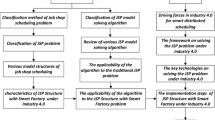Abstract
With the growing of economic globalization and world economic integration, customer demands are becoming increasingly personalization and diversification. How to design a reasonable schedule scheme becomes the key point of industries. Flexible job shop scheduling problem (FJSP) is an extension of the classical job scheduling problem (JSP). It is an important problem in the modern manufacturing system, and constitutes to one of the most difficult combinatorial optimization problems. This paper defines an objective function, which aims at minimizing the makespan, under the conveyor constraints. Moreover, we present a genetic algorithm (GA)-based approach to optimizing the objective. Specifically, we firstly propose a method for solving conveyor-constrained FJSP (CDFJSP) by using a plug-in greedy algorithm and a binary search algorithm. Considering the unexpected events that usually occur in real-life applications, a real-time method with dispatching rules (RDRP) is proposed. Extensive experimental results demonstrate the efficacy of our proposed methods.










Similar content being viewed by others
References
Ak B, Koc E (2012) A guide for genetic algorithm based on parallel machine scheduling and flexible job-shop scheduling. Procedia-Social Behavi Sci 62:817–823
Bierwirth C (1995) A generalized permutation approach to job shop scheduling with genetic algorithms. Operat-Res-Spektr 17(2–3):87–92
Błażewicz J, Ecker K.H, Pesch E, Schmidt G, Weglarz J (2007) Handbook on scheduling: from theory to applications. Springer, Berlin
Brucker P, Schlie R (1990) Job-shop scheduling with multi-purpose machines. Computing 45(4):369–375
Chiang TC, Lin HJ (2013) A simple and effective evolutionary algorithm for multiobjective flexible job shop scheduling. Int J Product Econo 141(1):87–98
Demir Y, İşleyen SK (2013) Evaluation of mathematical models for flexible job-shop scheduling problems. Appl Mathemat Modell 37(3):977–988
Dong R, He WP (2012) Hybrid genetic algorithm-ant colony optimization for fjsp solution. Comput Integrat Manuf Sys 18(11):2492–2501
Driss I, Mouss KN, Laggoun A (2015) A new genetic algorithm for flexible job-shop scheduling problems. J Mech Sci Tech 29(3):1273–1281
Du Kim H, Kim JS (2003) An online scheduling algorithm for grid computing systems. In: International Conference on Grid and Cooperative Computing, pp 34–39. Springer
Falkenauer E, Bouffouix S (1991) A genetic algorithm for job shop. In: ICRA, pp 824–829. Citeseer
Graham RL, Lawler EL, Lenstra JK, Kan AR (1979) Optimization and approximation in deterministic sequencing and scheduling: a survey. Ann Discrete Maths 5:287–326
Grobler J, Engelbrecht AP, Kok S, Yadavalli S (2010) Metaheuristics for the multi-objective fjsp with sequence-dependent set-up times, auxiliary resources and machine down time. Ann Operat Res 180(1):165–196
Holthaus O, Rajendran C (1997) Efficient dispatching rules for scheduling in a job shop. Int J Product Econ 48(1):87–105
Izakian H, Abraham A, Snasel V (2009) Comparison of heuristics for scheduling independent tasks on heterogeneous distributed environments. In: 2009 International Joint Conference on Computational Sciences and Optimization, vol. 1, pp 8–12. IEEE
Li J, Pan Q, Xie S, Liang J (2010) A hybrid pareto-based tabu search for multi-objective flexible job shop scheduling problem with e/t penalty. In: International conference in swarm intelligence, pp 620–627. Springer
Li X, Gao L (2016) An effective hybrid genetic algorithm and tabu search for flexible job shop scheduling problem. Int J Product Econom 174:93–110
Liou CD, Hsieh YC (2015) A hybrid algorithm for the multi-stage flow shop group scheduling with sequence-dependent setup and transportation times. Int J Product Econom 170:258–267
Mastrolilli M, Gambardella LM (2000) Effective neighbourhood functions for the flexible job shop problem. J Schedul 3(1):3–20
Mei Y, Nguyen S, Zhang M (2017) Evolving time-invariant dispatching rules in job shop scheduling with genetic programming. In: European Conference on Genetic Programming, pp 147–163. Springer
Milner S, Davis C, Zhang H, Llorca J (2012) Nature-inspired self-organization, control, and optimization in heterogeneous wireless networks. IEEE Transact Mobile Comput 11(7):1207–1222
Moon C, Kim J, Gen M (2004) Advanced planning and scheduling based on precedence and resource constraints for e-plant chains. Int J Product Res 42(15):2941–2955
Dowsland KA, Thompson J (2012) Simulated annealing. Handbook of Natural Comput 1:623–1655
Nguyen S, Zhang M, Johnston M, Tan KC (2012) A computational study of representations in genetic programming to evolve dispatching rules for the job shop scheduling problem. IEEE Transact Evolution Computat 17(5):621–639
Nowicki E, Smutnicki C (2005) An advanced tabu search algorithm for the job shop problem. J Schedul 8(2):145–159
Okamoto A, Gen M, Sugawara M (2006) Integrated data structure and scheduling approach for manufacturing and transportation using hybrid genetic algorithm. J Intell Manufact 17(4):411–421
Pezzella F, Morganti G, Ciaschetti G (2008) A genetic algorithm for the flexible job-shop scheduling problem. Comput & Operat Res 35(10):3202–3212
Qu BY, Suganthan PN, Liang JJ (2012) Differential evolution with neighborhood mutation for multimodal optimization. IEEE Transact Evolut Computat 16(5):601–614. https://doi.org/10.1109/TEVC.2011.2161873
Suresh R, Mohanasundaram K (2006) Pareto archived simulated annealing for job shop scheduling with multiple objectives. The Int J Adv Manufact Tech 29(1–2):184–196
Tay JC, Ho NB (2008) Evolving dispatching rules using genetic programming for solving multi-objective flexible job-shop problems. Comput & Ind Eng 54(3):453–473
Torabi S, Karimi B, Ghomi SF (2005) The common cycle economic lot scheduling in flexible job shops: the finite horizon case. Int J Product Econom 97(1):52–65
Đurasević M, Jakobović D (2016) Comparison of solution representations for scheduling in the unrelated machines environment. In: 2016 39th International convention on information and communication technology, Electronics and Microelectronics (MIPRO), pp 1336–1342. IEEE
Wang B, Xie H, Xia X, Zhang X (2018) A nsga-ii algorithm hybridizing local simulated-annealing operators for a bi-criteria robust job-shop scheduling problem under scenarios. IEEE Transact Fuzzy Sys 27(5):1075–1084
Wang J (2011) Scheduling for the flexible job-shop problem based on a hybrid genetic algorithm. Sens Lett 9(4):1520–1525
Wisittipanich W, Kachitvichyanukul V (2011) Differential evolution algorithm for job shop scheduling problem. Ind Eng Manage Sys 10(3):203–208
Yska D, Mei Y, Zhang M (2018) Genetic programming hyper-heuristic with cooperative coevolution for dynamic flexible job shop scheduling. In: European Conference on Genetic Programming, pp 306–321. Springer
Zhang H, Cao X, Ho JK, Chow TW (2016) Object-level video advertising: an optimization framework. IEEE Trans Ind Infor 13(2):520–531
Zhang R, Song S, Wu C (2013) A hybrid differential evolution algorithm for job shop scheduling problems with expected total tardiness criterion. Appl Soft Comput 13(3):1448–1458
Ziaee M (2014) A heuristic algorithm for solving flexible job shop scheduling problem. Int J Adv Manufact Tech 71(1–4):519–528
Author information
Authors and Affiliations
Corresponding author
Ethics declarations
Conflict of interest statement
No conflict of interest exits in the submission of this manuscript, and manuscript is approved by all authors for publication. I would like to declare on behalf of my co-authors that the work described was original research that has not been published previously, and not under consideration for publication elsewhere, in whole or in part. All the authors listed have approved the manuscript that is enclosed.
Additional information
Publisher's Note
Springer Nature remains neutral with regard to jurisdictional claims in published maps and institutional affiliations.
Rights and permissions
About this article
Cite this article
Yan, H., Du, X., Xu, L. et al. Toward intelligent clothes manufacturing: a systematic method for static and dynamic task allocation by genetic optimization. Neural Comput & Applic 34, 7881–7897 (2022). https://doi.org/10.1007/s00521-022-06890-6
Received:
Accepted:
Published:
Issue Date:
DOI: https://doi.org/10.1007/s00521-022-06890-6




